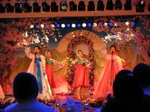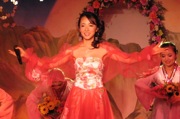My orals (PhD general exam) are over and I passed. I don’t think that what I have to say about it differs much from what everyone seems to say about. I was terribly nervous leading up the exam, especially since I knew there were gaping holes in my knowledge.
Two days before the test I had a horrible nightmare that reflected my anxiety with almost textbook precision. In the dream I walked into my orals and seated myself in front of my examiners only to notice that I was wearing nothing but my underwear. In a moment of complete terror, I considered running out to find some clothes to put on but since the professors were already there I decided to pretend as if there was nothing unusual about my attire. The oral examination proceeded but all of us struggled collectively not to admit openly what we all knew: that I was almost completely naked before them.
 The dream motivated me to make extra sure I had all my clothes prepared the day before (though I had to borrow some nice shoes from a roommate since winter boots, hiking shoes, and two pairs of sneakers are apparently all that I own). However, it was too late to remedy my more troubling epistemological nudity. I spent the last few hours before the exam reviewing notes and timelines but Rebecca was working in the history department’s library. She tried hard to convince me that nothing I read or reviewed at this point would make a bit of difference (ok, ok, she was totally right), and successfully distracted me by describing some recent online debates she was involved in concerning academics, breasts, and blogs, and the fact that the complete episodes of He-Man have been released on DVD. When I left the library to go eat something before my exam, instead of my four fields of history all I could think of for some reason were the cartoons that came up in our discussion and how much I would liked to have a kind of a “Care Bear Stare” power to dazzle my advisors during the exam. Then I got to thinking about which care bear I liked the best and wondered, again, if the show had planted anything subversive into my mind as a child. The end result of all this was to distract me from thinking about the trial to come, however, so I really owe Rebecca some thanks.
The dream motivated me to make extra sure I had all my clothes prepared the day before (though I had to borrow some nice shoes from a roommate since winter boots, hiking shoes, and two pairs of sneakers are apparently all that I own). However, it was too late to remedy my more troubling epistemological nudity. I spent the last few hours before the exam reviewing notes and timelines but Rebecca was working in the history department’s library. She tried hard to convince me that nothing I read or reviewed at this point would make a bit of difference (ok, ok, she was totally right), and successfully distracted me by describing some recent online debates she was involved in concerning academics, breasts, and blogs, and the fact that the complete episodes of He-Man have been released on DVD. When I left the library to go eat something before my exam, instead of my four fields of history all I could think of for some reason were the cartoons that came up in our discussion and how much I would liked to have a kind of a “Care Bear Stare” power to dazzle my advisors during the exam. Then I got to thinking about which care bear I liked the best and wondered, again, if the show had planted anything subversive into my mind as a child. The end result of all this was to distract me from thinking about the trial to come, however, so I really owe Rebecca some thanks.
The exam itself was more like a two hour conversation with my four field advisors (the fields being Modern Korea, Modern Japan, Aftermaths of Modern War, and Early Modern European Intellectual History). After the exam the professors sent me out into the hall while they deliberated. There were a number of my friends outside waiting and my roommate Nick brought me a gallon of orange juice to celebrate (they all know I don’t drink, and the joke is that I drink enough orange juice that it, rather than blood, flows in my veins). When the professors emerged and announced the result, they seem to know from experience how anxious the waiting student can be and without fail they offered their warm congratulations and kind words.
As everyone else I spoke to also seemed to indicate, you don’t start thinking about exactly how incompetent some of your responses sounded during the exam until much later. In my case it wasn’t until the day after that this mental process kicked into gear. If there is one thing graduate students master very early on, it is how to tear any argument apart and dismiss the published results of years of hard historical research with a few sharp attacks. It is so bad in my case that I feel like somewhere along the line I should have been asked to take a class on “Reading Sympathetically” and perhaps one entitled, “Construction after Deconstruction.” At any rate, once my mind’s attack dogs were released onto the field of my memories about the event, there seemed to be no end to the folly of my orals performance.
Reflecting on this, I think this very destructive mental review process helps explain why so many of my friends have forgotten so many of the details of an event that I assumed would be forever retained. Already I can feel my mind trying to therapeutically smother the flames and bury the memory with vague images of smiling professors, the delicious looking cookies they served during the five minute break in the middle, and that strange warped blackboard I faced with one corner completely detached from the wall. Its over now, no need to continually reenact the whole two hours in my mind. I can now begin thinking more about a dissertation topic and the new rhythms and challenges of life as a third year student and teaching fellow.
 What makes this place special is the fact that is jointly run by South Koreans and North Korean defectors, who make up much of the staff. Waitresses were dressed in characteristically North Korean black and white traditional dress and the climax of the evening came with an on-stage performance by several North Korean dancers and singers. As someone from the management explained to us when we came in, “They once sang for their country, now they are singing for themselves.” They performed various North Korean songs, some of which seemed to be familiar to the audience. The several dozen visitors who were there tonight were mostly middle aged or older but included at least one three generational family complete with grandmother and toddler.
What makes this place special is the fact that is jointly run by South Koreans and North Korean defectors, who make up much of the staff. Waitresses were dressed in characteristically North Korean black and white traditional dress and the climax of the evening came with an on-stage performance by several North Korean dancers and singers. As someone from the management explained to us when we came in, “They once sang for their country, now they are singing for themselves.” They performed various North Korean songs, some of which seemed to be familiar to the audience. The several dozen visitors who were there tonight were mostly middle aged or older but included at least one three generational family complete with grandmother and toddler.
 The dream motivated me to make extra sure I had all my clothes prepared the day before (though I had to borrow some nice shoes from a roommate since winter boots, hiking shoes, and two pairs of sneakers are apparently all that I own). However, it was too late to remedy my more troubling epistemological nudity. I spent the last few hours before the exam reviewing notes and timelines but
The dream motivated me to make extra sure I had all my clothes prepared the day before (though I had to borrow some nice shoes from a roommate since winter boots, hiking shoes, and two pairs of sneakers are apparently all that I own). However, it was too late to remedy my more troubling epistemological nudity. I spent the last few hours before the exam reviewing notes and timelines but